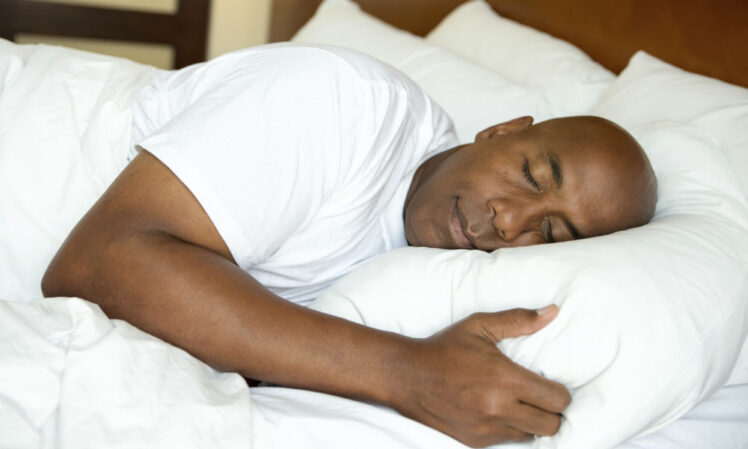You probably know that maintaining good health requires eating healthy food, getting exercise, and having a generally positive outlook on life. But did you know that sleep also plays a significant role in keeping you healthy?
Most people would agree that sleep is important, but few know it’s actually a vital component for human health. If you don’t get enough deep, restorative sleep each night, you’re putting yourself at risk for emotional and physical health problems. Poor sleep can have a massive impact on your quality of life, and you might be surprised to learn what qualifies as “poor.”
Before diving into all the ways you might be getting poor sleep, it’s important to understand what happens while you sleep so you can know what you’re missing when you don’t get good sleep.

Source: helpguide.org
Contents
The purpose of getting a good night’s sleep
What exactly happens while you sleep? While researchers don’t have all the answers, one thing is exceptionally clear – a good night’s sleep makes you wake up feeling rested and you have more energy to function throughout the day. If either of these elements are missing, there’s a tendency to feel irritable, annoyed, and reactive even to small things.
Your body also repairs itself during sleep, which is especially important when you’re dealing with an injury. This process likely plays a role in why you feel so rested when you get good sleep.
When you don’t get good sleep, you’re preventing your body from engaging an important healing mechanism and playing it out all night for cellular repair. You’re also depriving yourself of the restoration you get from entering a deep state of REM.
Periodic poor sleep can lead to a bonafide sleep disorder
If you’re not getting deep REM sleep, and your body isn’t allowed to repair itself, you can end up with a sleep disorder. This is true even if you’re only missing out on sleep once in a while.
For instance, you might end up with insomnia, disruptions to your normal sleep cycle, or major sleep deprivation. In fact, you can be sleep deprived and also be completely unaware of the problem. Sleep deprivation occurs when you don’t get enough deep sleep – the kind your body is designed for. Even if you get 12 hours of sleep each night, you can still be sleep deprived if your night is spent lightly sleeping or being interrupted several times.
It’s also possible that poor sleep could be an indication of an underlying health condition. In either case, sleep disorders tend to get worse with time when left untreated.

Source: m.timesofindia.com
Eight signs you might have a sleep disorder
Do you experience any of the following? If so, you might have a sleep disorder.
- Blurred vision or lack of focus.
- Mental fog. It’s common to have difficulty thinking or concentrating.
- Memory problems. Sleep helps your brain form connections that solidify memories. Poor sleep interferes with this process.
- Slow reaction times. You might also experience poor balance and a lack of coordination.
- Poor circulation. Because of this, you might always be cold.
- High blood pressure. This can lead to diabetes or heart disease.
- Weakened immune system. Your immune system becomes weaker when you don’t sleep well and you might get sick more often.
- Mood changes. This includes developing anxiety or feeling irritable, stressed, or triggered.
- Weight gain. Without good sleep, the chemicals that tell your brain you’re full don’t work right, which often leads to overeating.
Sleep disorders are treatable
When you’re struggling with sleep in a way that impacts your daily functioning, sleep disorder treatment from a reputable organization like TherapyTribe can help. If you suspect you may have a sleep disorder, you’ll want to connect with a health professional to get into a sleep study so your issue can be diagnosed properly. While the impact for people with different sleep disorders can be the same, a diagnosis will help you get treated properly.
In the meantime, there are some things you can do to help yourself as much as possible. For instance, avoid caffeine, start drinking warm chamomile tea before bed, try over-the-counter melatonin, and start a daily meditation practice. All of these things can contribute to getting better sleep.

Source: happybeds.co.uk
What are the different sleep disorders?
Here are eight of the most common sleep disorders:
- Insomnia. The inability to fall or stay asleep, or get deep restful sleep.
- Sleep bruxism. Bruxing is when a person grinds or clenches their teeth while they sleep. It’s not always a problem if it happens once in a while, but can become severe.
- Narcolepsy. A person with narcolepsy suffers from attacks where they fall asleep at random times when they are wide awake, just living their life. It’s said to be caused by strong emotional reactions.
- Hypopnea. Not quite as severe as sleep apnea, but breathing becomes shallow and difficult until the lack of oxygen jolts the person awake.
- REM Sleep Behavioral Disorder (RBD). This is where a person acts out their dreams physically, and it’s usually violent.
- Sleep apnea. This is when a person stops breathing while asleep. Usually, their body jerks them awake. Sleep apnea often requires a device to keep the airway open at night. If not treated, it can be life-threatening.
- Restless leg syndrome. The urge to move that’s concentrated in the legs, which makes it hard to lie still in bed.
- Night terrors. Although triggered by nightmares, night terrors are more severe. People often sit up and move around violently as if they are awake, but they are still asleep. Sometimes night terrors are accompanied by sleepwalking and aggressive behavior.
If you think you have a sleep disorder, see a professional
You deserve to get a good night’s sleep every night. If you’re not getting deep, restful sleep, or you have signs and symptoms of a sleep disorder, see a health professional right away. Don’t let poor sleep ruin your health. Sleep problems tend to get progressively worse over time, so the sooner you seek help, the better.
